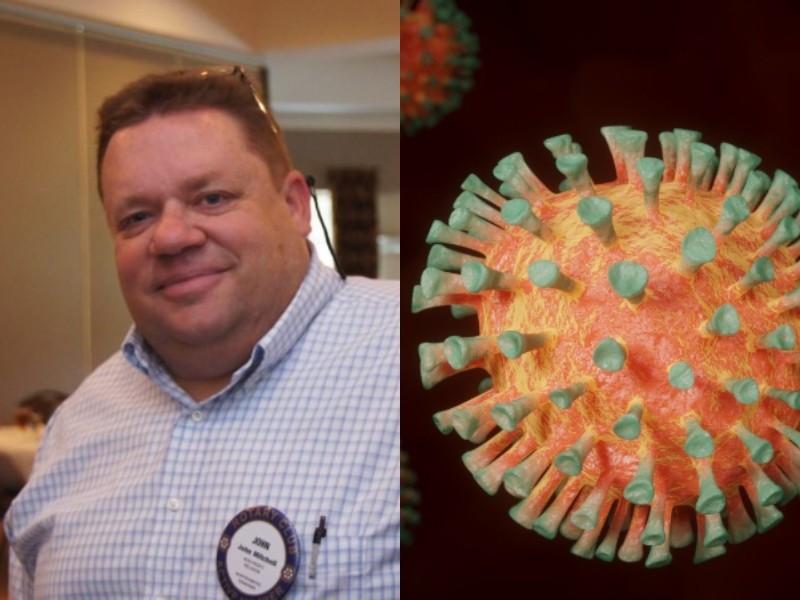John Mitchell, who is the Development Director at Salvation Army, is one of those people who is always helping others. When his COVID-19 symptoms took a turn for the worse, he found himself at St. Thomas Rutherford Hospital asking for help. He was immediately put into intensive care. The disease went from a slight cough and a mild temperature to full blown pneumonia in eight days. He wanted to share his story so people understand that the disease needs to be taken seriously.
“My symptoms were unlike anything I have felt before,” said Mitchell. “By the time I was dealing with constant fever, headache, fatigue, and then diarrhea for multiple days, I felt like the shell of a person.…my mental state was changing hour by hour.”
On March 27, Mitchell called the Rutherford County Health Department to get tested, as that was the only way at the time, but he didn’t have enough symptoms. The next day he was hit hard by fever, headache, and fatigue. Then came the diarrhea. At 9:30 a.m. on March 30, he took the first drive through COVID-19 test at Murfreesboro Medical Clinic, and by that evening he was driving himself to the emergency room. His x-rays showed pneumonia developing, he was given a Z-Pac and sent home to continue to quarantine with his family. By this time his wife was showing symptoms.
“My wife started with a cough and headache about a day after I quarantined myself on March 28,” added Mitchell, “but her symptoms never got worse. She tested on April 13, and got a positive result by phone call on April 15.”
She was left to take care of their two sons at their home – while trying to self-isolate — when, on April 5, John ended up in an ambulance on the way back to the emergency room at St. Thomas Rutherford. His temperature had been hanging between 101 and 102.6 degrees, the pneumonia had gotten worse, and Tylenol was reducing the fever a little, but doing nothing for the constant headache and severe fatigue. He was immediately put on oxygen. He was also given another test for coronavirus, as he still didn’t have results from the first test. In 24 hours, it came out positive.
“I was in the hospital eight days,” said Mitchell. “I was not put on a ventilator, but I had a ventilator in the room if I needed it. Thank God, I didn’t need it.”
Hydroxychlorine has been in the news, and it is one of the medicines that Mitchell was given from the beginning, along with the Z-pack he was given on his initial trip to the ER. Those helped his body fight the disease, and he is on oxygen at home. His doctor is now focusing on anti-inflammatories. Those seem to be helping him the most.
“I’m doing much better now,” said Mitchell. “All of my vitals are good, and symptoms are gone, except for my lungs needing time to fully recover from the pneumonia and COVID-19. I had a web consultation with my regular doctor, and I was told it might take up to a month for my lungs to fully recover. I have been told to do light exercises throughout the day. I will get an x-ray and blood work on Monday, April 27 to access my progress.”
He is not the only one from the Salvation Army who suffers from COVID-19. Five current staff members and one former staff member have tested positive. Two ended up in the hospital, one got put on a ventilator for a while. Both are now home on oxygen. One other fought it off at home, but, according to Mitchell, probably should have gone to the hospital. And three others have had mild symptoms, including fever and fatigue. However, none of their residents have tested positive.
Recently, at a Rotary Club of Murfreesboro Zoom meeting, Gordon Ferguson, CEO of St. Thomas Rutherford Hospital, said that not all those with COVID-19 have the common symptoms like fever, dry cough, tiredness, and trouble breathing. Less typical symptoms include loss of taste and smell, runny nose, nasal congestion, chills, malaise, disorientation, nausea, muscle aches, and diarrhea.
One of the reasons that Mitchell is sharing his experience is because he wants people to know that COVID-19 is not a joke. He wants people to stay at home and flatten the curve, and know that wearing masks, social distancing, washing hands, and not touching your face are all important to keep people healthy. It is a rough road to get your health back after getting the disease.
“Faith, prayers, and support from family and friends are what kept me going,” said Mitchell. “And the care at the hospital, the docs and the staff starting on the fifth, was what made things start getting better.”


















